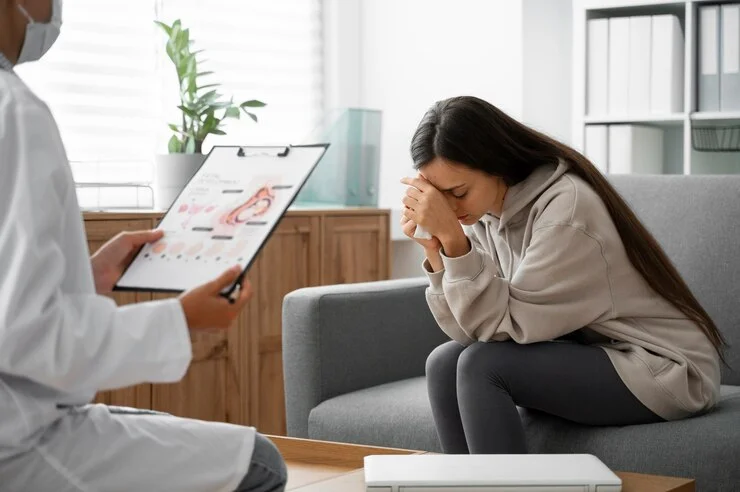How to Get a Mental Health Diagnosis: A Comprehensive Guide
Introduction
Mental health is a vital aspect of our lives that profoundly impacts our thoughts, emotions, and behavior. It influences our ability to handle stress, connect with others, and make decisions. Despite the growing awareness about its importance, many people still struggle with mental health issues without knowing how to seek help or get a diagnosis. Getting a mental health diagnosis is a crucial first step towards understanding and managing one’s mental health problems, providing a path to proper treatment and support. This blog post aims to clarify the process of obtaining a mental health diagnosis, offering valuable insights and steps for those who want to improve their mental health. Understanding Mental Health and Its Importance.

Understanding Mental Health and Its Importance
Mental Health Defined
Mental health refers to our overall well-being in terms of our thoughts, behaviors, and emotions. It encompasses how we think, feel, and act on a daily basis. When we are mentally healthy, we are able to recognize our own strengths and abilities, manage the typical challenges of life, work effectively, and make valuable contributions to our communities.
Significance of Mental Health
The significance of mental health cannot be overstated. It is as crucial as physical health to our overall well-being. Mental health influences how we handle stress, relate to others, and make decisions. Good mental health allows people to live their lives to the fullest, whereas poor mental health can hinder daily life, relationships, and physical health.
Common Misconceptions
There exist several misunderstandings regarding mental health that can hinder people from seeking help or receiving a proper diagnosis. One common misconception is that individuals with mental health issues are weak. However, mental health disorders can impact anyone, irrespective of strength, character, or background. Another prevalent myth is that people with mental health problems cannot recover. This notion is incorrect because with the right treatment and support, most individuals with mental health problems can achieve a significant degree of recovery.
Recognizing the Signs and Symptoms
Recognizing the signs of mental health issues is the first step toward seeking help. Symptoms can vary depending on the condition.
- Persistent sadness or low mood
- Excessive fears or worries
- Extreme mood changes, including uncontrollable “highs” or feelings of euphoria
- Withdrawal from friends, family, and activities
- Significant weariness, low energy, or sleeping issues
- Detachment from reality (delusions), paranoia, or hallucinations
- Inability to deal with daily issues or stress
- Trouble understanding and relating to situations and to people
- Alcohol or drug abuse
- Major changes in eating habits
- Sex drive changes
- Excessive anger, hostility, or violence
- Suicidal thinking
If you or someone you know is experiencing these symptoms, it may be time to seek professional help.

Seeking Professional Help
The process of getting diagnosed with a mental health condition usually starts with a visit to either a primary care physician or a mental health professional, such as a therapist, psychologist, or psychiatrist. These professionals can perform a thorough evaluation to determine if a mental health disorder is present.
- Primary Care Physicians: They can screen for mental health conditions, provide an initial diagnosis, and refer you to a specialist if needed.
- Psychiatrists: Medical doctors who specialize in diagnosing and treating mental health conditions, often through medication.
- Psychologists and Therapists: Professionals who specialize in diagnosing mental health conditions and providing therapy but typically do not prescribe medication.
Preparing for Your First Appointment
Before your first appointment, it’s helpful to write down any symptoms you’ve been experiencing, along with any questions you might have. Also, note any significant life changes or stressors, as these can impact your mental health. Being open and honest with your healthcare provider will help them understand your situation better and make a more accurate diagnosis.
The Diagnostic Process
Mental health professionals rely on diagnostic manuals such as the DSM-5 (Diagnostic and Statistical Manual of Mental Disorders, Fifth Edition) or the ICD-10 (International Classification of Diseases, Tenth Revision) to assess if a patient has a particular mental health condition. These manuals provide a list of symptoms, the duration of symptoms, and how the symptoms affect the patient’s ability to function.
Initial Evaluation
The first step in the diagnostic process is an initial evaluation, which may involve:
- Clinical Interview: A detailed conversation where the therapist asks about your symptoms, health history, family history of mental health issues, lifestyle, and overall functioning.
- Physical Examination: Sometimes, physical issues can cause symptoms similar to those of mental health conditions. A physical exam can help rule out these other causes.
- Psychological Questionnaires or Assessments: These are standardized instruments designed to measure various aspects of mental health, including mood, anxiety levels, thought patterns, and more.
Diagnostic Criteria
Mental health professionals use diagnostic manuals such as the DSM-5 (Diagnostic and Statistical Manual of Mental Disorders, Fifth Edition) or the ICD-10 (International Classification of Diseases, Tenth Revision) to determine if a patient meets the criteria for a specific mental health condition. These criteria include a list of symptoms, how long symptoms must be present, and how the symptoms affect an individual’s ability to function.
Types of Assessments and Tests
- Psychological Testing: This can include a range of tests to assess cognitive function, memory, reasoning abilities, and personality characteristics.
- Laboratory Tests: In some cases, doctors may order blood tests or other lab tests to rule out physical causes of symptoms, such as thyroid dysfunction or vitamin deficiencies.
Understanding the criteria for mental health diagnoses and the assessments used can demystify the process and make it more accessible for individuals seeking help.
After the Diagnosis: Steps Forward
Receiving a mental health diagnosis can be a life-changing experience, sometimes overwhelming, but a crucial step towards recovery and effective management of mental health.
Coping with the Diagnosis
It’s normal to have mixed feelings about your diagnosis. Some people might feel relieved to have a name for their struggles, while others might feel labeled or stigmatized. It’s important to give yourself time to process these feelings and to seek support from friends, family, or support groups.
Treatment Options
The treatment for mental health conditions varies based on the diagnosis. Generally, it can include a combination of therapies, medications, and lifestyle changes.
- Therapy: Various forms of psychotherapy, such as cognitive-behavioral therapy (CBT), are effective for many mental health conditions.
- Medication: Medication can be crucial for managing symptoms, especially for conditions like depression, anxiety, bipolar disorder, and schizophrenia.
- Lifestyle Changes: In order to support your mental health, it is important to incorporate regular physical activity, maintain a healthy diet, get adequate sleep, and practice stress management techniques.
- Support Groups: Joining a support group provides an invaluable sense of community and shared experience.
Building a Support System
Having a strong support system is vital for anyone dealing with a mental health condition. This can include friends, family, healthcare providers, and peer support groups. These supports can offer emotional comfort, practical help, and the motivation to stick with treatment.
Navigating Challenges in Getting Diagnosed
Despite growing awareness, several challenges can impede the path to getting a mental health diagnosis. These include stigma, lack of access to mental health services, and navigating the complexities of the healthcare system.
- Overcoming Stigma: Stigma around mental health can make individuals hesitant to seek help. Educating yourself and others, and speaking openly about mental health, can help combat stigma.
- Access to Care: Financial constraints, limited availability of specialists, and geographic barriers can make accessing mental health care difficult. Exploring telehealth options, community mental health services, and sliding scale fees can help.
- Advocating for Yourself: Navigating the healthcare system can be daunting. It’s important to advocate for yourself, ask questions, and seek second opinions if necessary.

Maintaining Mental Wellness Post-Diagnosis
After receiving a mental health diagnosis, the journey towards mental wellness continues. Maintaining mental health is a dynamic process that requires ongoing attention and care. Here are some strategies to support mental wellness:
1. Engage in Ongoing Treatment
Consistency in treatment is crucial. Whether it’s attending therapy sessions, taking prescribed medication, or both, sticking to your treatment plan is essential for managing symptoms and preventing relapse.
2. Develop a Wellness Toolbox
A wellness toolbox is a set of personal strategies and tools that help manage mental health symptoms. This can include mindfulness practices, physical activity, hobbies and interests, and relaxation techniques. Tailor your toolbox to fit your interests and what works best for you.
3. Set Realistic Goals
Breaking larger goals into smaller, achievable steps can provide a sense of purpose and accomplishment. Celebrate your progress along the way.
4. Foster Healthy Relationships
Surround yourself with individuals who are helpful and understanding. Healthy connections can offer emotional support and alleviate feelings of isolation. Do not be scared to express your demands and boundaries to those closest to you.
5. Prioritize Self-Care
Self-care is an essential component of mental wellness. This means different things to different people but includes basics like adequate sleep, nutrition, physical activity, and time for relaxation and leisure activities.
6. Continue Learning
Empower yourself to take charge of your mental health by seeking reputable sources of information, attending workshops, or joining support groups to learn more about managing your condition.
7. Monitor Your Mental Health
Be mindful of changes in your symptoms or mood and take proactive steps if you notice worsening signs. Regular check-ins with your mental health provider can help adjust your treatment plan as needed.
Final Words of Encouragement
Obtaining a mental health diagnosis is a brave and crucial step towards understanding yourself and seeking the help you need. Remember, your diagnosis does not define you. It’s a part of your journey towards wellness, a tool to guide your path forward. Embrace the journey with patience and self-compassion, knowing that progress might be slow and non-linear. There will be challenges, but there will also be victories, big and small.
Your mental health journey is uniquely yours. It’s about finding what works for you, adapting to changes, and growing stronger through the process. By advocating for yourself, seeking support, and maintaining hope, you can navigate the complexities of mental health with resilience and courage.

Conclusion
The path to getting a mental health diagnosis and beyond is filled with learning, growth, and self-discovery. It requires courage to face the unknown and strength to seek help. This guide aims to provide you with the knowledge and steps to navigate this path, from recognizing the need for help to maintaining wellness after a diagnosis.
Mental health is a crucial aspect of our general well-being. By prioritizing it, seeking out support, and advocating for our needs, we can lead more satisfying and significant lives. Let’s collaborate in eradicating negative attitudes towards mental health, supporting each other on our journeys, and building a more compassionate world where asking for help is considered an indication of strength.
Remember, you’re not alone. Help is available, and with the right support and resources, healing and growth are possible. Prioritize your mental health, for it’s the foundation upon which you can build a life filled with joy, resilience, and fulfillment.
FAQs
FAQ 1: How Do I Know If I Need a Mental Health Diagnosis?
Answer: If you’re experiencing persistent changes in your mood, behavior, or thoughts that negatively impact your daily life, relationships, or work, it might be time to seek a mental health diagnosis. Common signs include prolonged sadness, excessive worry, changes in sleep or appetite, difficulty concentrating, or feeling overwhelmed by stress.
FAQ 2: What Should I Do First to Get a Mental Health Diagnosis?
Answer: The first step is to consult with a healthcare professional, such as your primary care physician or a mental health specialist like a psychiatrist or psychologist. They can provide an initial assessment and refer you to the appropriate services for a comprehensive evaluation.
FAQ 3: How Are Mental Health Conditions Diagnosed?
Answer: Mental health conditions are diagnosed through a combination of clinical interviews, psychological assessments, and sometimes physical examinations to rule out other causes. Mental health professionals use standardized diagnostic criteria, such as those found in the DSM-5, to determine the presence of a mental health disorder.
FAQ 4: Can I Get Diagnosed with a Mental Health Condition Online?
Answer: Yes, with advancements in telehealth, it’s possible to receive a mental health diagnosis online. Online mental health professionals can conduct assessments and interviews via video calls. However, it’s important to ensure that the service provider is reputable and that the professional is licensed to practice in your location.
FAQ 5: What Happens After I Get a Mental Health Diagnosis?
Answer: After receiving a diagnosis, you and your healthcare provider will discuss the most effective treatment options for your condition. This may include therapy, medication, lifestyle changes, or a combination of these. It’s also a good time to build a support system and consider joining support groups to connect with others facing similar challenges.







